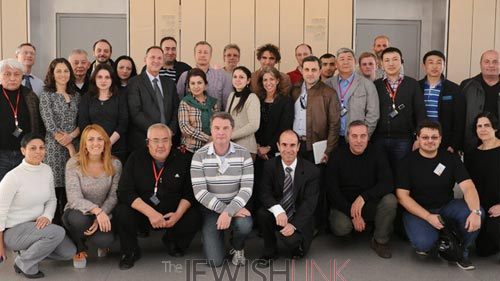The first of its kind renewable energy workshop was recently organized by the UN Economic Commission for Europe (UNECE) together with Israel’s Agency for International Development Cooperation (MASHAV), and Ministry of Foreign Affairs.
The renewable energy sector in Israel began over 40 years ago, when Israel was one of the first countries to adopt solar technologies in the 1970s. To date, there are 200 renewable energy companies in the state.
Over time, countries across the world have been attempting to utilize their existing energy resources, find alternative energy sources and new technologies as demand only increases.
Twenty-three experts and policymakers from across Eurasia took part in the workshop to learn of successful renewable energy practices and energy efficiency technologies Israel. The workshop, which was held from February 8-12, set to strengthen capacities to promote energy efficiency and the implementation of renewable energy across Eurasia.
Participants, among them national and urban stakeholders, decision makers and practitioners, hailed from 14 countries in South-Eastern and Eastern Europe, Caucasus and Central Asia. They included Montenegro, Serbia, Russia, Tajikistan, Turkmenistan, Ukraine, Uzbekistan, Georgia, Kazakhstan, Kyrgyzstan, Macedonia, Georgia, Azerbaijan, and Armenia.
Three UNECE officers accompanied the program; Economic Affairs Officers, Oleg Dzioubinski and Viktor Badaker of the UNECE Sustainable Energy Division and the ESCAP Economic Affairs Officer of the Environment and Development Division, Sergey Tulinov.
Throughout the five-day workshop, the high-level professionals visited various sites of renewable energy technology deployment across Israel, including the Hiriya Recycling Park and Arrow Ecology Environmental Management Services southeast of Tel Aviv to see how municipal facilities convert energy into energy. In the Arava, they also visited the Solar Thermal Power Tower and the Bio-Gas System Yotvata Dairy. The group also spent time in the north learning of solar panels water heating at Chromagen at Kibbutz Sha’ar Ha’amakim.
Workshop sessions also served as a platform for discussion of enhancing international cooperation in energy infrastructure and development, as well as financing and investment opportunities from public and private sources.
According to the UNECE, Israel’s sharing of its know-how in research, manufacturing, marketing and application of energy efficiency and renewable energy products, was very much appreciated by the experts who took part in the workshop and study tour.
The United Nations Economic Commission for Europe was established in 1947 and is one of the five regional commissions of the United Nations. It promotes pan-European economic integration and brings 56 countries together in its goals to promote sustainable development and economic prosperity.
